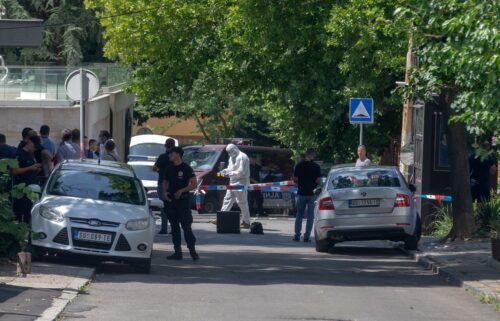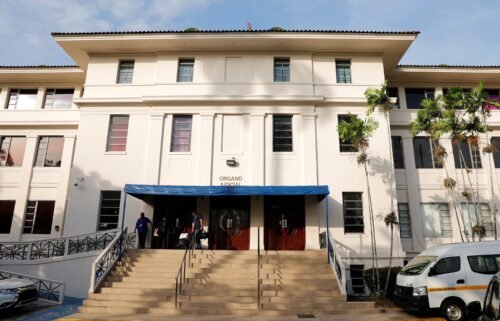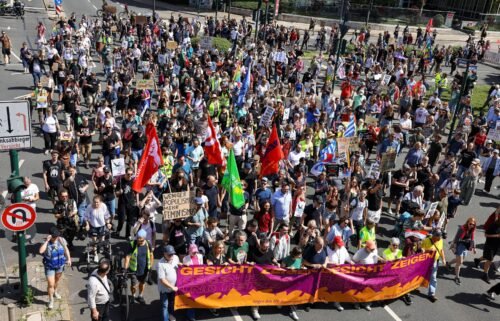‘This is the blood of my son’: While Israel hailed rescue of four hostages, Palestinians recall the horrors
(CNN) — Bullet holes fleck the bloodstained walls of the Miqdad family home, in Nuseirat camp, central Gaza.
CNN footage from the house shows a cream teddy bear perched on a white cupboard, with broken plastic strewn across the shelves. In another room, mother-of-four Rasha Abdel Miqdad shudders with grief, before breaking down in tears.
“This is the blood of my son, Yamen. May God bless his soul,” the 32-year-old Palestinian told CNN on June 12. “My son was innocent.
“We are civilians, and we have no connection to the resistance or anything or any faction. We have no connection to it at all.”
CNN spoke to seven members of the family who described a horror-filled haze of gunfire, tank artillery and aerial bombardment around their home on June 8. Israeli forces stormed through the building searching for militants and indiscriminately spraying bullets, according to the family members. Four people suffered gunshot wounds, leaving one child severely injured and 12-year-old Yamen dead, the family alleged to CNN. Soldiers interrogated and beat male relatives, and forced a child to strip, relatives claimed.
The Israel Defense Forces (IDF) released footage on June 16 showing forces in the Miqdad’s house on the same day as a high-profile hostage rescue operation nearby. In the heavily edited video, shared on social media and described as forces “securing the area” during the operation, members of the Israeli Paratroopers Reconnaissance Battalion appear to enter the home. The video does not show what happened on the third floor, where the family say they were attacked.
CNN has reached out to the IDF but has not received a response to the specific allegations made.
The allegations provide a window into the scale and force of this Israeli operation to free hostages taken during the attack on Israel last October. Eyewitnesses say they are still traumatized, after more than 270 Palestinians were killed and another 698 people injured on June 8, according to authorities in Gaza. Health staff said that hospitals, already stretched beyond their limits, were completely overwhelmed.
These extremely high reported casualty tolls prompted renewed warnings from human rights organizations who say Israel is not doing enough to protect civilians as it prosecutes its war, and that militants are endangering Palestinian lives.
The UN human rights office (OHCHR) warned that Israeli forces and Palestinian armed groups may have committed war crimes through their actions. OHCHR spokesman Jeremy Laurence said the Israeli operation “seriously calls into question whether the principles of distinction, proportionality and precaution… were respected” and that, by holding hostages in densely populated areas, Palestinian armed groups are “putting the lives of Palestinian civilians, as well as the hostages themselves, at added risk.”
It was not clear how many of those killed were militants. The Ministry of Health in Gaza does not distinguish between civilians and combatants. But the ministry said many of those impacted were women and children, as well as people recently displaced by Israel’s offensive in the southern city of Rafah.
The IDF has disputed the ministry’s numbers, claiming that casualties from the operation were “under 100.” CNN cannot independently verify the casualty figures given by either side.
The IDF said special forces teams launched the rescue operation in Nuseirat camp just after 11 a.m. local time, and by 11:25 a.m. had begun raids on both buildings where hostages were being held. After exchanging heavy fire with militants, and as the surrounding area came under intense Israeli missile and rocket fire, the special forces retrieved the hostages then started to travel out of the camp, toward an area near the US military’s floating pier on the Mediterranean coast.
It was along this route that Israeli forces stormed the Miqdad family house for between 30 and 45 minutes, according to eyewitness accounts corresponding with videos analyzed by CNN. Flames and plumes of smoke billow over wrecked vehicles in the aftermath of the operation, according to footage taken at 1:10 p.m. local time and obtained by CNN. Civilians wail over bodies heaped on top of each other, as young children look up to the sky in disbelief. In one frame, filmed on a nearby street, members of the Miqdad family can be seen carrying their injured children into a car as Israeli drones buzz overhead.
The Miqdad family home, which a CNN team visited later, stands just under a mile (1.5 km) from the site where the hostages were held, as determined by CNN through video analysis.
“They left nothing behind. It’s all destroyed,” said the mother Rasha, speaking fourtwo days after the operation. “The room is full of blood. My children’s clothes are all blood.
“There is no safe place… no place where we can protect ourselves.”
Israel launched its military offensive in Gaza after the Hamas-led October 7 attacks on southern Israel, in which at least 1,200 people were killed and more than 250 others abducted.
Israeli attacks in Gaza have since killed 37,598 Palestinians and injured at least another 86,032 people, according to Gaza health officials.
‘Felt like an earthquake’
Artillery and missile fire erupted near the Miqdad family home before the Israeli forces entered on June 8, the father, Mohammad, told CNN.
He said he gathered his family – some 14 people, mostly women and children – into a room. The family trembled with fear as the voices of soldiers grew closer, until, they claim, the troops kicked down the door, opened indiscriminate fire, threw stun grenades and pointed weapons at some of the children.
“They came to the apartment we were at, and started shooting and saying, ‘Who is here, who is here?’ We told them we were civilians, children and women,” Mohammad told CNN.
Rasha told CNN the raid “felt like an earthquake,” adding that soldiers confiscated their cell phones. “They carried weapons, pointing them at an eight-month-old baby and a four-month-old baby.”
Israeli troops detained the two men present and demanded to know whether there were any militants in the building, Mohammad said. He and his father-in-law, Abdul Raouf, 58, tried to declare their innocence. Then, they allege, soldiers forced bags over their heads, tied their hands behind their backs and physically assaulted them.
Mohammad’s second oldest child, Ahmad, is still reeling from the attack. The 13-year-old told CNN he could hear the soldiers beating his father and grandfather in the hallway, before he claims he was himself forced to strip. Soldiers then told him to put his clothes back on, he said, before he was taken out of the room and “punched,” pointing to his face.
“He asked me to take off my clothes to make sure I was a little boy,” Ahmad recalled.
“He threw me to the ground and put blindfolds on me,” he said. “He wanted to tie me, but I started kicking with my feet, so he put his shoe here,” he said, pointing to his neck, “and stepped on me to silence me.
“They meant to kill me.”
Mohammad told CNN that before the Israeli forces withdrew, they threatened to shoot his relatives, after which he heard gunshots.
“The soldier said, ‘If you don’t tell me where the resistance fighters are and where the weapon is in your house, I will kill your children,’” Mohammad said. “He went to the room,” he said, referring to the part of the house where the women and children were, adding, “A minute after, and I heard the gunshots.” Ahmad told CNN: “At that moment, we assumed my brothers had been killed.”
It is not clear if any of the family members were hit in the second round of shooting.
Bullet casings that appear in a video filmed by CNN at the house are stamped with IMI, which denotes the Israeli weapons manufacturer Israeli Military Industries, according to two weapons experts, Richard Weir, senior researcher in the Crisis and Conflict division at Human Rights Watch (HRW) and Trevor Ball, a former US Army senior explosive ordnance disposal team member. One casing is a 9mm caliber, likely a pistol, or a machine pistol or a submachine gun, Weir said.
Israeli forces were in the house for up to 45 minutes, family members told CNN. When they eventually left, Mohammad, still blindfolded, says he called on Rasha to remove the bag over his head. They say their two sons were limp and bleeding from multiple gunshot wounds.
One of their children, Mumen, 16, says he was shot in his shoulder and abdomen, while his younger brother, Yamen, 12, had bullet injuries to his abdomen and leg.
“I called the ambulance, but they said they cannot come because the area is dangerous,” Mohammad told CNN.
Instead, the family raced north by car to Al-Awda Hospital. But for Yamen, it was too late. “They gave him CPR for 10 minutes, but he was already martyred,” Mohammad said.
‘Massacre’ at local hospitals
The footage obtained by CNN from the area shows survivors clambering over rubble as missiles streak across the sky. Entire buildings are hollowed out. Palestinian men and boys delicately cover dead bodies with blankets, trying to give dignity to those killed in the Israeli operation.
Hospital workers say they could not manage the flood of casualties from the daytime raid, which was carried out when the streets and market were busy with people. At least 250 Palestinians wounded in Nuseirat were transferred from Al-Aqsa Martyrs Hospital to Nasser Hospital, according to health authorities.
Al-Aqsa hospital is serving nearly five times the number of in-patients it had pre-war with just one functioning electricity generator, the UN’s Office for Humanitarian Affairs reported on June 10. Footage from the hospital courtyard taken on June 8 shows trucks lined with shrouded bodies and men trying to comfort shellshocked children, as scores of Palestinians clamor to get seen by medics.
“There were many martyrs lying in the streets,” said Rasha’s mother, 54. “The street was full of people and the planes were shooting.”
Critical shortages of resources including painkillers at Al-Aqsa hospital hampered efforts to treat trauma wounds – including severe burns, open fractures, amputations and brain injuries, aid workers with Médecins Sans Frontières (MSF), also known as Doctors Without Borders, told CNN. Israel’s siege of Gaza has drastically reduced the entry of medical and other supplies.
“It was just like a plane crash had happened,” said Karin Huster, an MSF staffer who treated patients in the hours after the attack. “Pretty much everybody was on the floor, kids, women… hundreds of people.
“It takes a special kind of people to survive this,” she told CNN on June 11.
Another health worker at Al-Aqsa hospital, Maryame El Abbassi, said she is emotionally scarred after treating a severely burned child whose face “was melting” between her hands.
“I wish I wouldn’t have experienced the massacre,” the 23-year-old nurse told CNN. “I don’t think they invented any words that can describe how cruel the situation was… There were so many children brought in by strangers.
“Those kids will be traumatized until the end of their life,” she said.
Mumen, who is still being treated for wounds to his shoulder and abdomen, having been moved to Nasser Hospital in Khan Younis, southern Gaza, drew in labored breaths as he recalled what happened to his brother.
“My younger brother, Yamen, I saw them shooting him,” Mumen said on June 10. “They came into the room and simply shot us, without saying a word… My future is gone. My life is gone.”
The-CNN-Wire
™ & © 2024 Cable News Network, Inc., a Warner Bros. Discovery Company. All rights reserved.
CNN’s Ben Wedeman contributed reporting.



